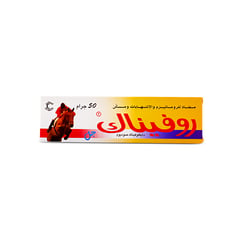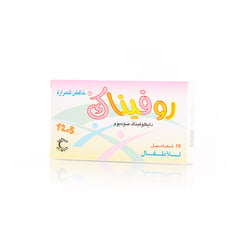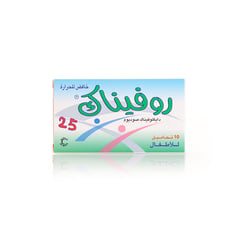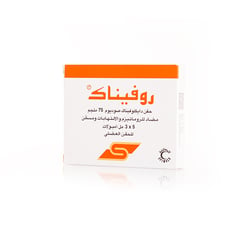Product Description:
Diclofenac sodium, the active ingredient in Rofenac, is one of a group of medicines called non-steroidal anti-inflammatory drugs (NSAIDs). NSAIDs reduce pain and inflammation.
How to use:
The doctor will tell you how many Rofenac to take and when to take them. Always follow his/her instructions carefully.
If you are not sure, ask your doctor or pharmacist. Keep taking your tablets for as long as you have been told, unless you have any problems. In that case, check with your doctor.
Taking Rofenac with Food and drink
Take the tablets with or after food.
Swallow the tablets whole with a glass of water. Do not crush or chew them as this will affect them.
The usual doses are:
Adults
100-150 mg daily divided into two or three doses. The number of tablets which you take will depend on the strength the doctor has given you.
Elderly
Your doctor may advise you to take a dose that is lower than the usual adult dose if you are elderly. Your doctor may also want to check closely that the Rofenac are not affecting your stomach.
Caution & Warnings:
Do not take Rofenac if
• You think you may be allergic to diclofenac sodium, aspirin, ibuprofen or any other NSAID, or to any of the other ingredients of Rofenac. (These are listed at the end of the leaflet.) Signs of a hypersensitivity reaction include swelling of the face and mouth (angioedema), breathing problems, runny nose, skin rash or any other allergic type reaction
• You have now, or have ever had, a stomach (gastric) or duodenal (peptic) ulcer, or bleeding in the digestive tract (this can include blood in vomit, bleeding when emptying bowels, fresh blood in feces or black, tarry feces)
• You have had stomach or bowel problems after you have taken other NSAIDs
• You have severe heart, kidney or liver failure
• You are more than six months pregnant (see Pregnancy and Lactation).
• You have ischemic heart disease
• You have peripheral arterial disease
• You have cerebrovascular disease
•You have congestive heart failure (New York Heart Association [NYHA] classification II – IV
b. Take special care with Rofenac:
• If you suffer from any stomach or bowel disorders including ulcerative colitis or Crohn's disease
• If you have kidney or liver problems, or are you elderly
• If you have a condition called porphyria
• If you suffer from any blood or bleeding disorder, your doctor may ask you to go for regular check-ups while you are taking these tablets.
• If you have ever had asthma
• If you are breast-feeding
• If you have heart problems, or have you had a stroke, or do you think you might be at risk of these conditions (for example, if you have high blood pressure, diabetes or high cholesterol or are a smoker)
• If you have Lupus (SLE) or any similar condition
Diclofenac treatment should only be initiated after careful consideration for patients with significant risk factors for cardiovascular events (e.g., Hypertension, Hyperlipidemia, diabetes mellitus, and smoking).
As the cardiovascular risks of diclofenac may increase with dose and duration of exposure, the shortest duration possible and the lowest effective daily dose should be used. The patient’s need for symptomatic relief and response to therapy should be re-evaluated periodically.
In post marketing reports, cases of drug-induced hepatotoxicity have been reported in the first month, and in some cases, but can occur at any time during treatment with diclofenac. Post marketing surveillance has reported cases of severe hepatic reactions, including liver necrosis, jaundice, hepatitis with and without jaundice, and liver failure. Some of these reported cases resulted in fatalities or liver transplantation.
Physicians should measure liver enzymes especially transaminases periodically in patients receiving long-term therapy with diclofenac during week 4 – 8 from starting of treatment.
Cardiovascular Risk:
NSAIDs may cause an increased risk of serious cardiovascular thrombotic events, myocardial infarction, and stroke, which can be fatal. This risk may increase with duration of use. Patients with cardiovascular disease or risk factors for cardiovascular disease may be at greater risk.
All dosage forms of Diclofenac are contraindicated for the treatment of peri-operative pain in the setting of coronary artery bypass graft (CABG) surgery.
Gastrointestinal Risk:
NSAIDs cause an increased risk of serious gastrointestinal adverse events including inflammation bleeding, ulceration, and perforation of the stomach or intestines, which can be fatal. These events can occur at any time during use and without warning symptoms. Elderly patients are at greater risk for serious gastrointestinal events.
Ingredients:
Diclofenac sodium 50mg A valid prescription should be available upon delivery
| Shipping Type | Express |
|---|
Write Your Own Review
The largest selection of casino games and sports bets at 1xbet app.








